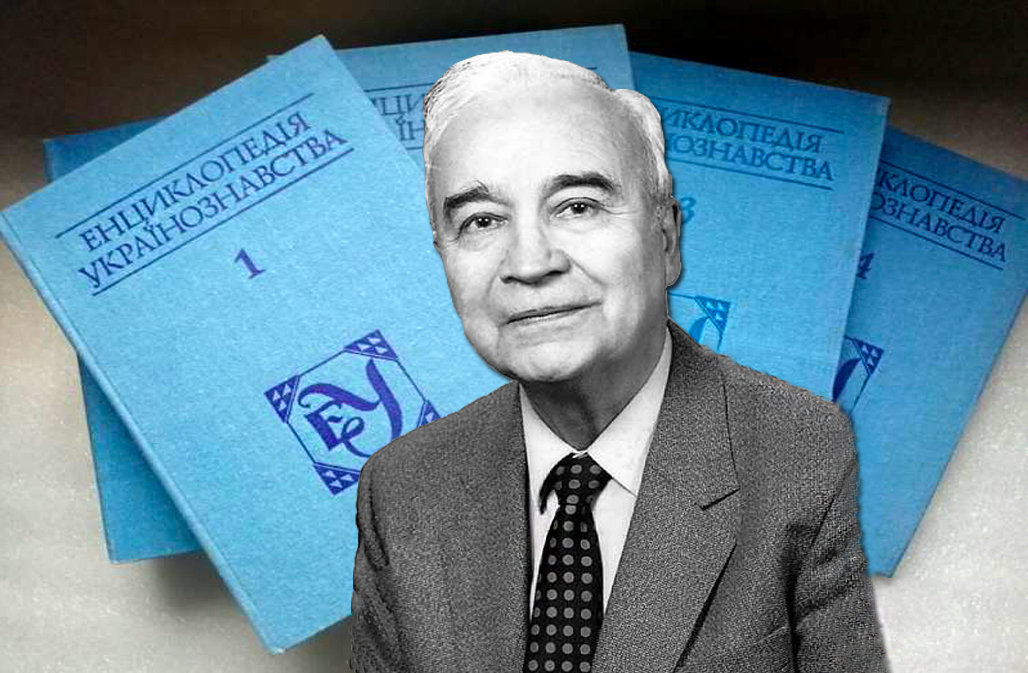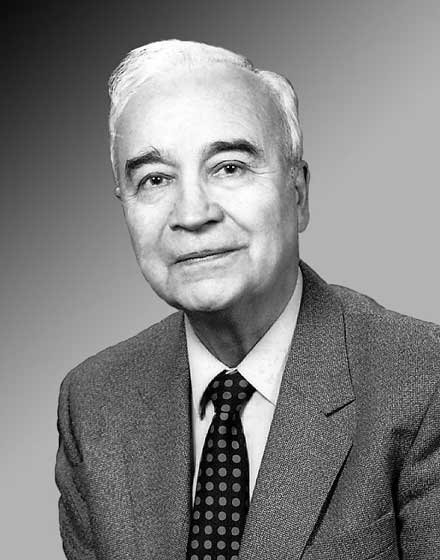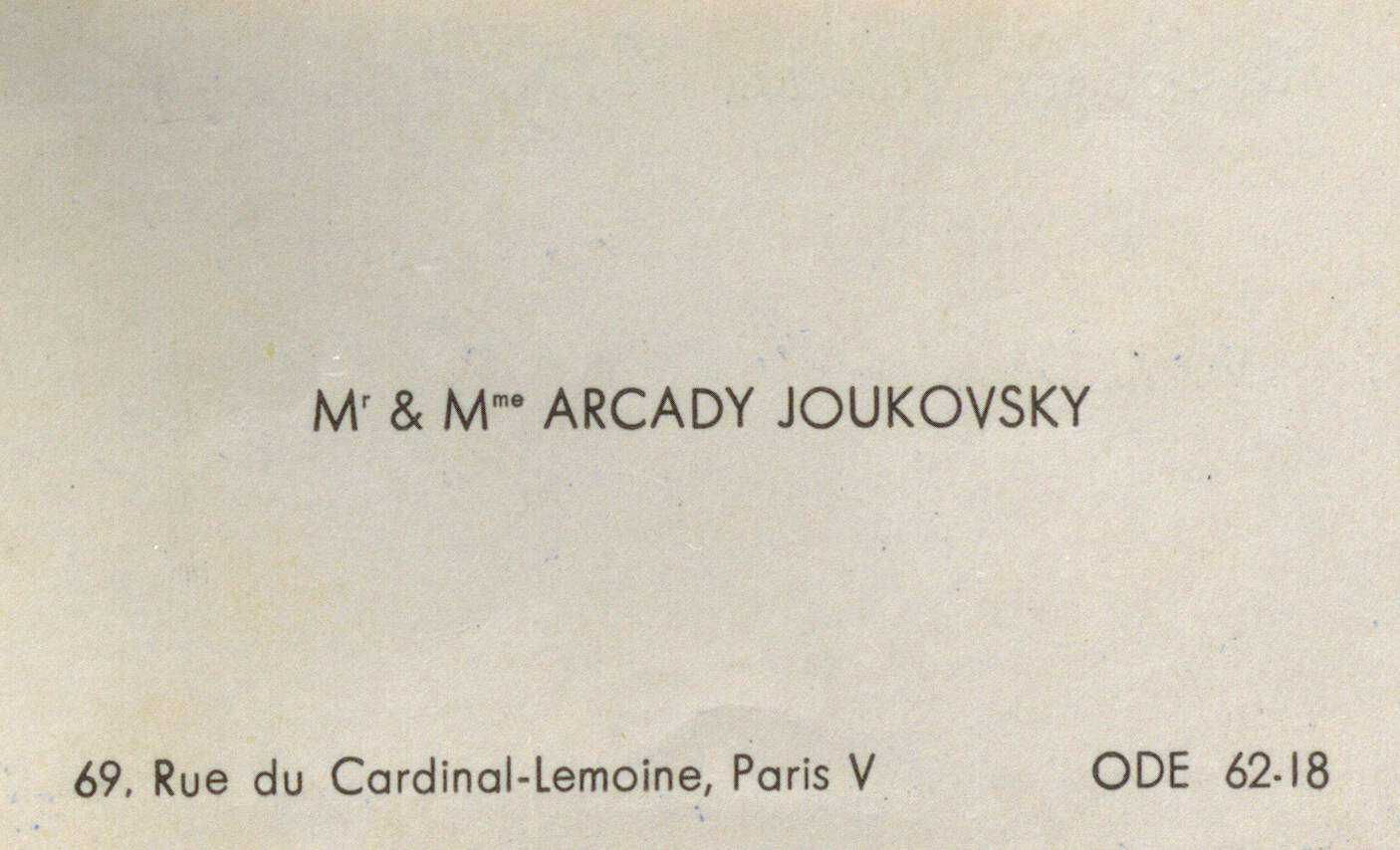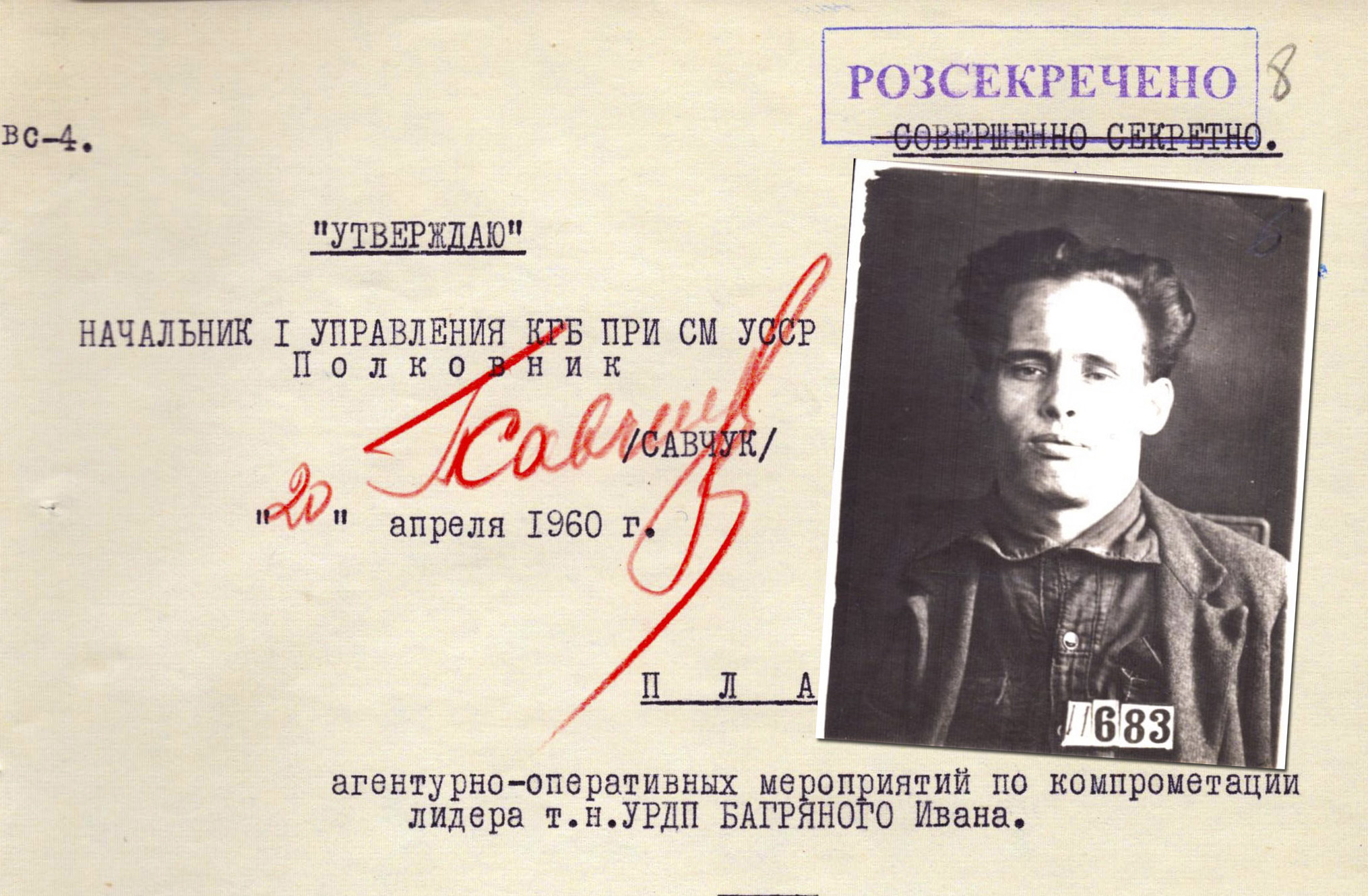Arkadiy Zhukovskyi. Historian, Encyclopedist, Ukrainianist
1/12/2022

The decision to open a case-form is dated April 1946. The case was opened by the 1st Intelligence) Directorate of the State Security Service of the Ukrainian SSR, which received information that an active OUN figure Zhukovskyi Arkadiy Ilarionovych, born in 1922, native of Chernivtsi, Ukrainian, was being treated in a tuberculosis sanatorium in Innsbruck, Austria. In 1940 he left Chernivtsi for Breslau (now Wroclaw, Poland), Germany, where he was one of the leaders of the OUN Provid of the city. While living in Breslau, reads the resolution, during the war he maintained contacts with the OUN Central Provid and with the OUN Provid in Galicia and Romania, and carried out active OUN work. Hence the operative coloring of the case - “Ukrainian nationalists».


It was at that time that the USSR MGB focused its efforts on working on the anti-Soviet underground, especially in Western Ukraine, and on the cultivation of émigré organizations, among which the OUN was of special importance. Therefore, the relevant categories of people abroad were immediately chalked up.
There is not enough information about A. Zhukovskyi's childhood and adolescence. But this did not interest Soviet special services. It is only noted that he was born in the family of a religious minister, an Orthodox priest, lived and studied in Chernivtsi until 1940, then continued his studies at the Faculty of Civil Engineering in Breslau. He was arrested by the Nazis during World War II and held in a concentration camp for three months. In 1944 he fled to Austria and from October 1944 to the spring of 1945 was treated in the tuberculosis sanatorium Gokhcirl in the Alps. Then - in a sanatorium in Innsbruck, where he came into view of the Soviet secret services.

Apparently, as in the situation with Vasyl Vyshyivanyi in Austria, the SMERSH military counterintelligence officers got a line on him. But they did not kidnap or arrest him. Arkadiy Zhukovskyi at that time was not that important in the emigrant circles, nor was he dangerous for the Soviet government. He was just starting out in politics, and he was seriously ill.
There are many mentions of the disease in correspondence with relatives and friends, which the USSR State Security Committee immediately brought under control. It is known from the letters that he had a complex lung disease. But the young body coped with the disease. From Innsbruck he moved to Graz, which was in the British zone, where he continued his studies at the local Technical High School.
At the same time, Arkadiy immersed himself in socio-political activities. He was one of the leaders of Ukrainian students, who, according to archival documents, at that time in the city numbered about two hundred. It is noted that a total of about 500 Ukrainian emigrants lived in Graz at that time, there was Melnykites branch of the OUN, which included 80 people. Soon A. Zhukovskyi became the leader of the OUN executive in Graz, he had pseudonyms “Honchar”, “Rohach”, “Taras Striletskyi”.
Besides, he was elected the Head of the Union of Ukrainian Student Societies in Austria (1947–1949) and a member of the board of the Central Union of Ukrainian Students (1948–1955). Even then he was distinguished by good oratory skills, deep knowledge, active position. One of the intelligence reports of January 3, 1947 reads:
“At the beginning of his political career, Zhukovskyi participated in the discussion of important political issues. Thus, during the 4th National Conference of the OUN-Melnykites in Austria (December 21-22, 1947) in the suburbs of Salzburg, he expressed the opinion that the PUN should develop tactics for members of the organization so that everyone had a clear idea of how to act in case of change of circumstances.
For example, Zhukovskyi explained, the world is currently in a tense state. A military conflict can take place any minute. Does everyone know what to do in this case? Does the PUN have an action plan for the members of the Organization in case the Bolsheviks break through to the West? What opportunities to escape the Bolsheviks will have those who are in foreign lands, thousands and tens of thousands of so-called DPs? What will they do? It is necessary to think about all this” (BSA of the SZR of Ukraine. - F. 1. - Case 13993. - Vol. 1. – P. 117).
As part of the OUN's organizational work, Arkadiy Zhukovskyi maintained contacts with members of the Central Provid, Denys Kvitkovskyi, Oleg Shtul, and others, most of whom lived in Paris. So it is not surprising that after graduating from Graz and obtaining a degree in urban planning, he went to France, where he was promised assistance in finding a job in the specialty.


But first, according to documents, in 1949 he visited his father, who lived in Bayreuth, Germany. He then stayed shortly in Munich, where he had contacts with leading OUN figures. And from there he went to Paris.
In France, A. Zhukovskyi began working as a civil engineer in the management of railway construction on the construction of railway bridges. During that time, he developed health problems again. This time - with kidneys. After long treatment and several operations, the right kidney had to be removed. This is known from the 1952 correspondence with his brother Volodymyr, who lived in Romania. Arkadiy wrote to him that he had experienced incredible pain and torment, had lost a lot of weight and was already preparing for the worst. But in his letters he wrote that he did not want to die because he had many plans which he really wanted to implement. The only thing he was happy about was that despite his long illness he was not fired, his salary was paid, and social services covered all medical expenses.
Soon A. Zhukovskyi returned to work and political activity. One of the documents states that on July 31, 1952, during the funeral in Paris of Colonel-General Mykhailo Omelyanovych-Pavlenko at the Pere Lachaise Cemetery, Professor V. Kubiyovych, General O. Udovichenko, Professor O. Shulhyn, and engineer A. Zhukovskyi spoke.
From 1952 through 1955 he participated in the activities of the Central Union of Ukrainian Students. In August 1955, at the congress of the Zarevo Association of Ukrainian Academic Societies in Munich, he was elected its leader.
This information about A. Zhukovskyi was accumulated in the case, which in January 1953 due to the excessive activity of the defendant was revised by the State Security Service of the Ukrainian SSR. The resolution prepared in this regard states that he “is one of the active members of the OUN-Melnyk in France, has broad ties among nationalists, in particular, is associated with Andriy Melnyk”. Since then, a new stage in cultivation had begun.




July 14, 1954, a document addressed to the Chief of the 1st Main Directorate (Foreign Intelligence) of the KGB under the Council of Ministers of the USSR, O. Panyushkin, was sent from Kyiv to Moscow from the Chief of the KGB under the Soviet Council of Ministers of the Ukrainian SSR V. Nikitchenko about the intention to cultivate A. Zhukovskyi. This was supported by arguments that he had broad connections among émigré organizations, participated in various events, was mobile, promising, and therefore, in case of a success, could be used to penetrate into the OUN leadership to address the KGB's strategic objectives.
In August 1954, a reply was received from Moscow stating that A. Zhukovskyi was still insufficiently studied. The KGB agents in Paris were instructed to take him into active cultivation, and only then to decide on the possibility of recruitment.
Since then, various operative sources of the KGB, who already operated in the OUN, as well as those who traveled to France through cultural, creative, and scientific exchange, had been directed at studying Zhukovskyi. Unsuspecting, he was friendly with everyone and presented them with his scientific works and books.
It was then that on his initiative a group of scientists, mostly compatriots, was created, who undertook to write a fundamental work on the history of the native land, such as Denys Kvitkovskyi, Teofil Bryndzan and others. The result of such cooperation was the publication in 1956 of the book “Bukovyna. Its Past and Present “, for which A. Zhukovskyi wrote a large chapter “History of Bukovyna”.
This 1,000-page book fell into the hands of the KGB and became subject to meticulous study. It was sent from Moscow to Kyiv with the following accompanying instructions: “Please consult the relevant specialists and get an assessment of this book in general and of the section written by A. Zhukovskyi in particular. It is desirable to receive a written critical review. These materials are needed for orientation of our employees who are abroad” (BSA of the SZR of Ukraine. - F. 1. – Case 13993. - Vol. 1. – P. 260).
In this regard, the KGB under the Council of Ministers of the Ukrainian SSR issued a resolution on an expert examination of the book. The analysis had to be done by scientists of the Institute of History of the Academy of Sciences of Ukraine. The following tasks were set: to determine the ideological orientation of the book and give it an assessment; to find out whether the facts and events presented in the book corresponded to reality and how correct they were from the point of view of history.
Among other things, the 35-page critical review, which was later sent to Moscow, concluded: “Seeing the history of Bukovyna as part of the history of the Ukrainian people as a whole and Bukovyna as part of Ukraine, the author sticks to the bourgeois-nationalist point of view of M. Hrushevskyi and others”.

Therefore, the KGB finally put on A. Zhukovskyi the stamp of a “Ukrainian bourgeois nationalist”. This happened in 1959. At the same time, the Center did not make a decision on the possibility of recruiting him. Instead, in early 1960, in preparation for First Secretary of the CPSU Nikita Khrushchev’s visit to France, the KGB worked to get French authorities to temporarily deport A. Zhukovskyi and two dozen other active Ukrainian emigrants to Corsica for fear of provocations against the Soviet leader.
Despite this, A. Zhukovskyi did not change his beliefs and did not stop political activity and research on the history of Ukraine. From 1959 he held the position of Secretary General of the Ukrainian Academic Society in Paris. In the 1960s he taught Ukrainian language, geography, history and art at the National Institute of Oriental Languages and Civilizations, and was a Professor at the Institute.
In 1969, he also became a Professor at the Ukrainian Free University (UVU) in Munich, and later Vice-Dean of the UVU Faculty of Philosophy. He defended two doctoral dissertations: the first, in 1969, at UVU, and the second, in 1976, at the Sorbonne. In 1968 he was elected Scientific Secretary, in 1987 - Chairman, and in 2009 - Honorary Chairman of the Shevchenko Scientific Society in Europe. From 1989 to 1995 he was President of the Symon Petliura Library in Paris.
He made a great contribution to the development of Ukrainian encyclopedic science. For many years he worked with the editorial team of “Encyclopedia of Ukrainian Studies”, where he held the position of editor, was the author of a number of articles and maps. From 1985, after the death of the editor-in-chief V. Kubiyovych, he headed the editorial board of the “Encyclopedia of Ukrainian Studies”. A total of 14 volumes were published. He was also a member of the editorial board of the English-language “Encyclopedia of Ukrainian Studies”, in particular, he was editor of the departments of religion and history. In the recent period of Ukrainian history he was co-chairman of the Main Editorial Board of the “Encyclopedia of Modern Ukraine” and author of several articles for it.

In the Provid of Ukrainian Nationalists, of which he was a long-term member, A. Zhukovskyi headed the office for the study of the current situation in Ukraine, as evidenced by archival documents. KGB agents and proxies who met with him in Paris and even visited him at home said in their reports that he lived modestly and had a large library, which he considered his greatest treasure. He always asked to bring and send him new books from Ukraine, scientific works on history, culture, dictionaries, periodicals, he subscribed to a number of Ukrainian newspapers and magazines, often sent materials on Ukrainian studies abroad to his acquaintances in Ukraine.
Thus, among the archival documents there is a report that “in May 1969, during political control over the foreign press entering the Republic, Golovlit detained a parcel in which a member of the Central Provid of OUN Solidarity Arkadiy Zhukovskyi sent to Ivan Dzyuba the pamphlet “Shevchenko Square in Paris”, published in March 1969” (BSA of the SZR of Ukraine. - F. 1. – Case 13993. - Vol. 1. – P. 389).
The KGB kept A. Zhukovskyi in sight all the time. But they failed to find a way to guarantee them the planned recruitment. It never came even to the development and approval of appropriate measures, as demanded by departmental orders and instructions. They limited themselves to intentions. Instead, the concept of “compromising” emerged in the case of operational cultivation. One of the documents states that “Zhukovskyi's further cultivation is being carried out in the direction of compromising him in the eyes of Ukrainian emigrants abroad”.
A special plan had been prepared for this purpose. It envisaged writing and publishing a pamphlet in the magazine Ukraina and its subsequent reprint in the newspaper Visti z Ukrainy, which was distributed abroad. Such a pamphlet was indeed published in the magazine on March 12, 1972, and was entitled “Mr. A. Zh. and Others from the Same Nest”. In it, A. Zhukovskyi and other Ukrainian figures were traditionally called agents of foreign intelligences, who, working off the tasks and the money received, denigrated the USSR.
According to the documents, this publication did not achieve the desired effect. In general, measures to compromise failed, because they could not find any compromising material on A. Zhukovskyi. Therefore, on September 22, 1982, the KGB of the Ukrainian SSR issued a resolution to terminate the case of his cultivation. The resolution stated: “Further cultivation of the object has no operational prospect of compromising due to lack of documentation and cessation of active anti-Soviet activities”.
The life and work of Arkadiy Zhukovskyi were rethought and his merits were recognized already in the independent Ukraine. In 1992, the National Academy of Sciences of Ukraine elected him a foreign member. In 1995 he was awarded the Taras Shevchenko Foundation Prize. He was awarded the Order of Merit of the Third Class and the Order of Merit of the Second Class for his Ukrainian studies and the establishment of Ukrainian-French relations. In 1997 he became an Honorary Doctor of the Yuriy Fedkovych National University of Chernivtsi and an honorary citizen of Chernivtsi.
Arkadiy Zhukovskyi died on October 2, 2014 in Paris. As he willed, he was buried in the family crypt at the Rusan Cemetery in Chernivtsi.


